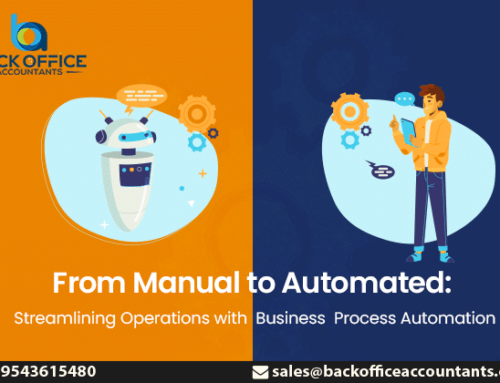Chief Financial Officers (CFOs) are becoming increasingly vigilant in identifying and preventing accounting errors that could have a major impact on their companies. These errors may include inaccuracies in financial reporting, failure to implement proper internal controls, and other similar issues. Such mistakes can result in penalties, fines, and harm to a company’s reputation.
As one of the leading remote accounting firms, Back Office Accountants has been closely working with CFOs of businesses across major industries. We have asked them share their valuable advice to the upcoming CFOs about the best accounting practices and transcribed their tips which we will be sharing in upcoming blogs. According to them, here are the top five accounting mistakes that business must avoid to reduce loss of time & capital, and ways one can do so:
Failure to Accurately Track and Report Revenue
As a CFO, one of the key responsibilities is to oversee the accurate tracking and reporting of revenue for the organization. Following proper accounts receivable practices can help with his problem. This includes making sure that all revenue is recognized in the appropriate period and that all revenue streams are properly tracked and reported. Here are a few key points to keep in mind:
- Failure to properly track and report revenue can lead to inaccurate financial statements. This can be a red flag for investors and regulatory bodies and can result in penalties and fines.
- Inaccurate financial statements can also damage the organization’s reputation.
- To avoid these mistakes, CFOs should establish a robust revenue recognition policy and ensure that all employees responsible for revenue recognition are properly trained.
- CFOs should also perform regular reviews of revenue recognition to ensure that all revenue is being recognized in the correct period and that all revenue streams are being properly tracked and reported.
Failing to Properly Account for Inventory
Properly managing inventory is crucial for any business as it can greatly impact its financial statements. Companies need to keep track of their inventory levels, value them correctly and document any changes made. Inadequate management can lead to errors in financial reports and can result in penalties and fines from regulatory agencies. This can be sorted by using professional accounts receivable services.
To avoid this, CFOs should implement a strong inventory management system and train their employees responsible for managing inventory. Regular reviews of inventory management should also be conducted to ensure that everything is accurately tracked and reported.
Neglecting Internal Controls
Effective financial management within an organization is greatly dependent on the implementation of internal controls. These controls are necessary to guarantee the accuracy of financial transactions and the trustworthiness of financial statements. Neglecting to establish internal controls can lead to severe consequences such as fraud and embezzlement.
These negative outcomes can be avoided, CFOs must put in place a comprehensive internal control policy and ensure that all employees receive proper training regarding the organization’s internal controls.
Failing to Properly Account for Taxes
Managing taxes is a crucial task for any organization, as they can represent a significant portion of expenses. Ensuring that all taxes are paid on schedule, following all relevant tax laws, and taking advantage of any available credits or deductions are essential for avoiding penalties and protecting the organization’s reputation.
It is important for CFOs to frequently review and audit the company’s tax situation to confirm that everything is in compliance and no opportunities for savings are missed. Having a right team of Back Office Accountants will help the cause as well.
Failing to Properly Account for Leases
Properly managing leases is crucial for any organization as they can pose a significant liability. Companies need to ensure that all leases are correctly classified, lease payments are recorded correctly, and any contingencies connected to leases are disclosed correctly. Failing to do so can result in misleading financial statements which can attract penalties and fines from regulatory bodies.
To avoid such scenarios, CFOs should establish a robust lease management policy and make sure that all employees involved in lease management are properly trained. Regular reviews of leases should also be carried out to check for accuracy in classification, payment recording, and contingency disclosure. Keeping abreast with the latest finance accounting standards such as FASB’s ASC 842 Leases will help ensure compliance with regulations.
As a CFO, it is vital to be conscious of the common errors that may happen in 2023 to prevent them and secure the financial stability of your organization. These errors include inadequate documentation, insufficient internal regulations, and not matching accounts, not keeping up with tax regulations and not seeking expert assistance when necessary.
One approach to reducing the risk of these mistakes is by outsourcing accounting and bookkeeping responsibilities to a trustworthy remote accounting firm like us at Back Office Accountants. Our qualified team of accounting experts can help fill all the accounting gaps with industry-best practices to improve accounting and financial performance without loss of capital and time. For high-ROI back office accounting services, you can contact us at: https://www.backofficeaccountants.com/







